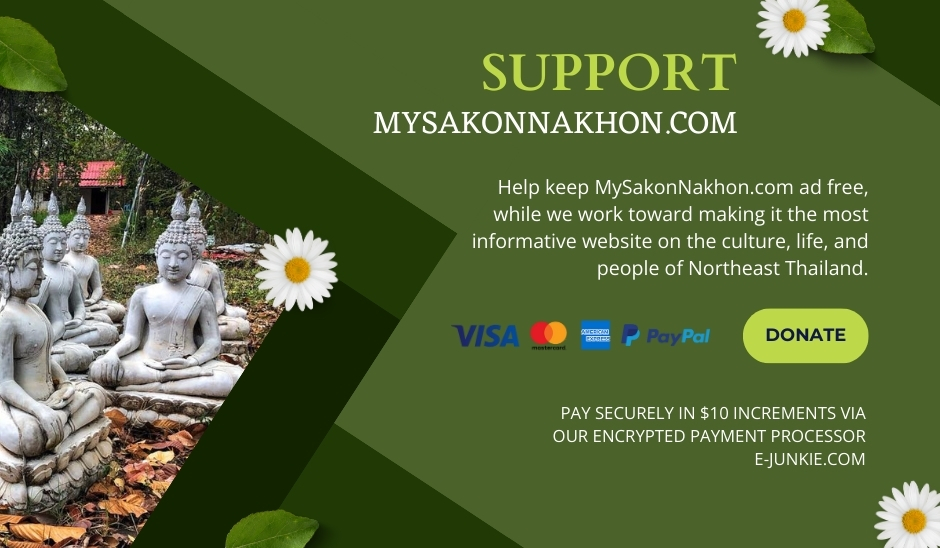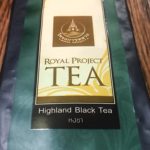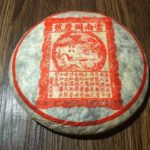
Kratom Use in Thailand: History, Effects & Benefits
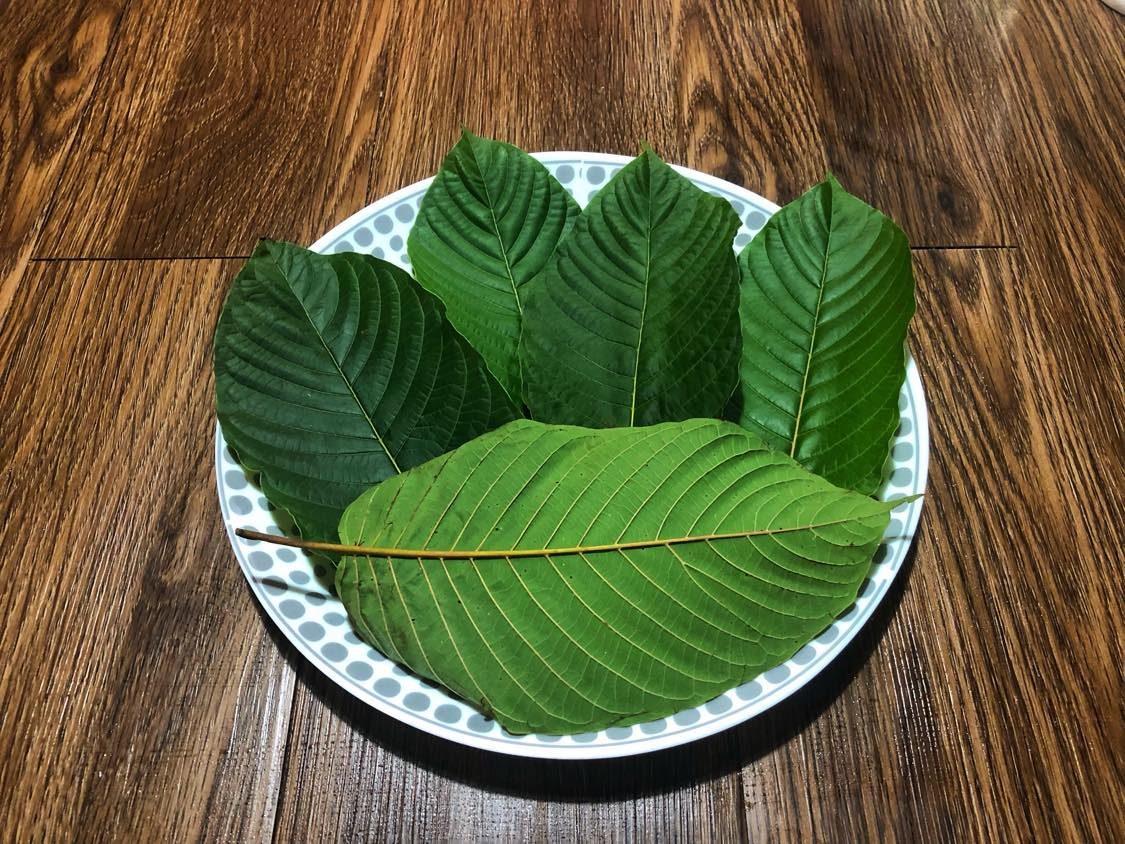
Kratom use in Thailand stretches back hundreds of years and is an integral part of Thai culture, especially in the southern provinces, such as Pattani, Yala, and Narathiwat, where the largest numbers of Thai Muslims reside. Kratom is a deciduous tree native to Thailand and other Southeast Asian countries. It has big, broad leaves that were chewed by Thai field workers as a stimulant to help them endure their labors under the hot sun. The leaves also are brewed to make kratom tea, which traditional Thai folk healers prescribed for a variety of ailments. The tea also is used as a communal drink and an alternative to alcohol (which Muslims are prohibited from drinking).
Kratom usage in Thailand was made illegal in 1943 with the passage of the Kratom Act. But enforcement was lax and kratom was still widely used publicly. However, in the 1970s the Thai government listed Kratom as a prohibited narcotic, and its use started to go more underground, with some Thai Muslims complaining that the prohibition was politically motivated — the South of Thailand being plagued by occasional unrest due to religious and ethnic separatist movements. Some Thai analysts have also suggested that the kratom prohibition was partly due to big pharmaceutical interests, who (during the 1970s) were trying to eliminate traditional Thai medicines in favor of modern drugs.
However, in more recent years there has been renewed interest and research into traditional Thai medicine, and the herbs which folk healers used for centuries to help cure ailments, boost health, and improve quality of life. This interest and study is what led to the 2021 legalization of kratom in Thailand, and the legalization of cannabis the following year (both substances had already been approved for strict medical and research use in 2018).
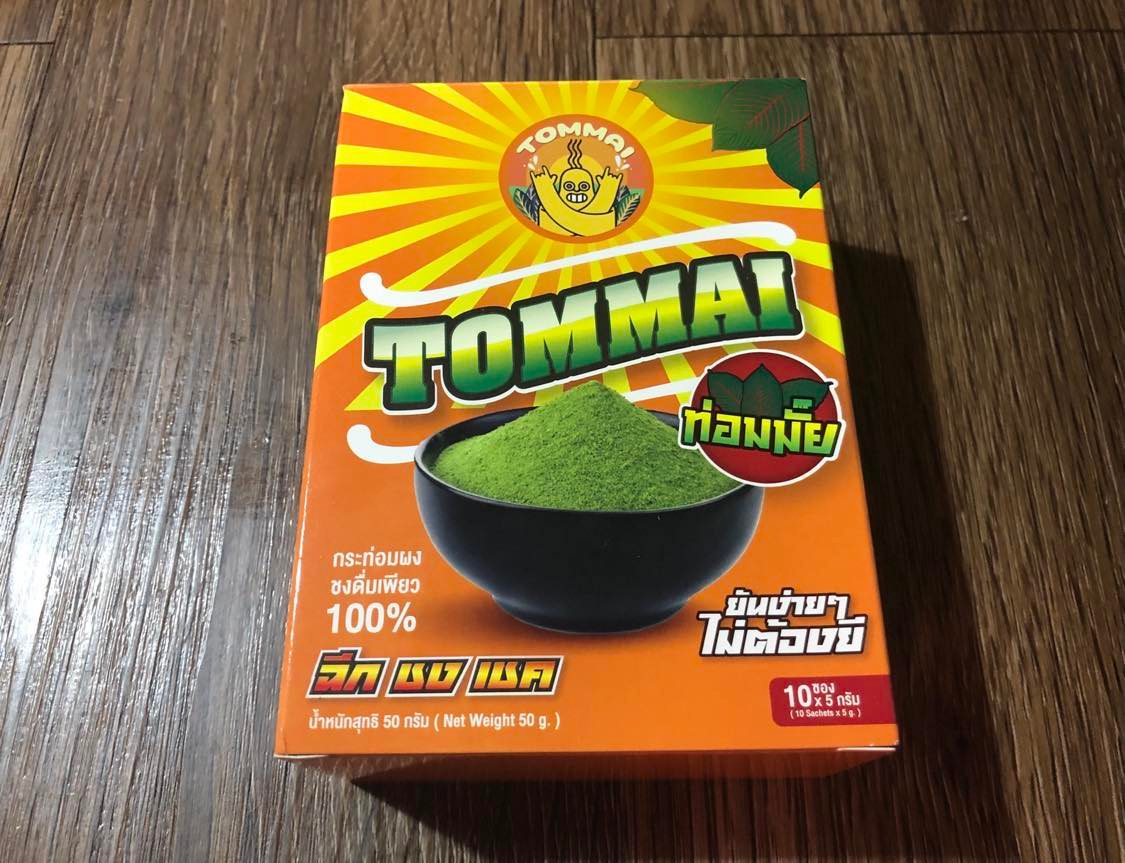
Thai Kratom Benefits & Effects
Kratom has traditionally been used for various medicinal purposes in Thailand. There are three strains of Thai kratom: white, green, and red (which correspond to the age of the leaf, red being the most mature). White kratom is said to be more energizing (like a coffee buzz but with less jitteriness); green kratom more uplifting (like a cup of coffee mixed with a shot of Baileys); and red kratom more sedating: thus it is used most often as a sleep aid, pain reliever, and as an alcohol substitute by heavy drinkers who would like to stop drinking. These color strains are seen in the center vein of the kratom leaf.
Most kratom users in Thailand are not that picky about the different strains of kratom (i.e. age of leaf), or are even aware of the differences. All three strains can have similar effects, depending on dosage. Kratom in small doses has a more stimulating effect, and in larger doses a more sedating effect.
The potential therapeutic benefits of kratom, according to traditional Thai medicine, include:
1. Pain relief: Kratom contains alkaloids that can interact with the body’s opioid receptors, which may help to relieve pain and discomfort.
2. Mood enhancement: Kratom can also have mood-enhancing effects, which may help to alleviate symptoms of depression and anxiety.
3. Energy and focus: Kratom has stimulating effects and can help to increase energy and focus, making it popular among manual laborers and those who need to work for long hours.
4. Relaxation and stress relief: Kratom can also have sedative effects, which may help to promote relaxation and reduce stress and tension.
5. Addiction recovery: Kratom has been used as an alternative to opioids for individuals seeking to overcome addiction to prescription painkillers or heroin.
6. Digestive aid: Kratom has been used traditionally to help with digestive issues such as diarrhea, constipation, and stomach cramps.
7. Blood sugar regulator: Kratom has been used to manage blood sugar levels in people with Diabetes II.
It should be noted of course that these benefits are based largely on the written records of Thai folk healers in the South of Thailand, as well as anecdotal evidence among users of kratom. However, new medical research in Thailand is beginning to affirm kratom’s benefits. For example, Thai researchers recently found that Kratom use may help prevent coronary heart disease or cerebrovascular disease via an improvement in the lipid profile.
Thai researchers also have studied villagers who believe that using kratom is superior to drinking alcohol (which makes people quarrelsome and causes hangovers), smoking cannabis (which makes people lazy), or smoking cigarettes (which smells and annoys people). They said that chewing kratom leaves and drinking kratom tea was harmless compared to booze, ganja, or cigarettes, and that it was something that made them happy, energetic, and more sociable. They also described a tradition where kratom leaves are used as an offering to God when in trouble and need of help.
It is important to note that kratom should not be mixed with alcohol, and it can be abused. Heavy usage can lead to addiction and withdrawal symptoms. However, studies of long time, moderate kratom users in the South of Thailand (i.e. regular drinkers of kratom tea) have not shown any negative consequences.
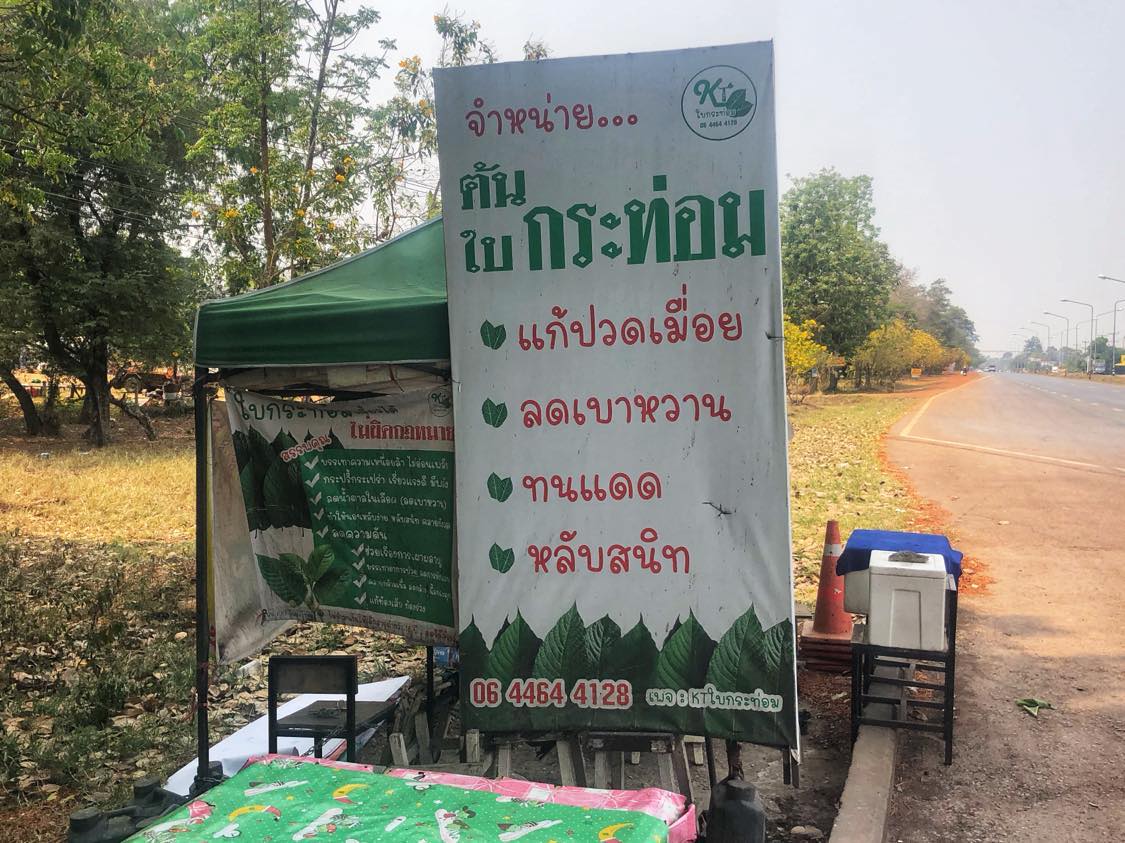
How to Find & Make Kratom Tea in Thailand
Since kratom has been legalized in Thailand, roadside vendors of kratom leaves and kratom tea have appeared. In Sakon Nakhon, there will several on the highway towards Udon Thani. A batch of around a dozen kratom leaves could be purchased for around 30-40 baht or 70 baht for 1/3 kilogram. However these sellers have recently disappeared for some reason.
Kratom leaves from roadside sellers in Thailand will almost always be the green strain, occasionally white, and rarely red (as they take the longest to mature). If you are looking for red kratom leaves, your best bet is to buy them from online from Lazada.co.th or Shopee.co.th (both of which are online retailers similar to Amazon). When searching one of these Thai websites for red leaf kratom, use the phrase: ใบกระท่อมก้านแดง. A kilogram bag (2.2 lbs.) of mixed strain kratom leaves can be bought online for around 150-250 baht (higher price usually has better quality leaves).
A bottle of kratom iced tea can be bought for 40-80 baht from many roadside sellers, depending on the size of the bottle. In addition, Thai kratom leaves pulverized into a powder and used as a tea mix are available (prices vary wildly) both online and in some shops. However, the powder is getting a bit more difficult to find from vendors on Lazada and Shopee, because it requires more strict licensing to sell kratom powder in Thailand.
While kratom users in the United States often talk about “toss and wash,” which means tossing a spoonful of kratom powder into your mouth and washing it down with something like orange juice, this is a rather disgusting practice. The traditional way of making kratom tea in Thailand is to place 10 -15 leaves in a large pot of water on the stove, bring it to a boil, reduce heat, and let steep for an hour. Then remove the leaves and squeeze in the juice of several limes. Sugar or honey is sometimes added, but it is not necessary, as the added lime reduces the bitterness of the kratom and makes for an excellent hot tea or iced tea.
You can also make kratom iced tea in Thailand by filling a blender or juicer with water, add 4-6 kratom leaves, and blend on high to pulverize the leaves. Then strain out the plant matter, add lime juice, and chill in the refrigerator. This makes for an excellent tasting tea, but some people do add a cup of regular green or black tea (which enhances the flavor)
If you want to make tea using kratom powder, you will find that the powder never really dissolves well. Therefore, one popular way to make kratom tea with powder is to mix a tablespoon of powder into a mug of kettle hot water. Let the powder steep for 30 minutes. Stir the concoction and pour into the filter of a coffeemaker. If desired, add some raw green or black tea. Then run a full pot of water through the coffeemaker. You’ll now have a full pot of kratom tea. Add lots of lime juice to the pot and drink hot or chill in the refrigerator for iced tea.
How to Pronounce Kratom (Eytymology)
You will often hear Westerners mispronouncing kratom as “kray-tuhm”. For example, this is the way comedian Joe Rogan often pronounces the word when talking about kratom on his popular podcast. His guests have also pronounced it this way. However, the etymology or origin of the word “kratom” is the Thai word “กระท่อม”. Kratom is the phonetic spelling of this Thai tree name. Thus the correct way to pronounce kratom is “gruh-tâwm”.
- Monogamy and the Mia Noi in Thailand - April 27, 2024
- How to Greet a Monk in Thailand – Saying Hello - April 22, 2024
- The Hottest Place in Thailand – Record High Temperature - April 22, 2024
